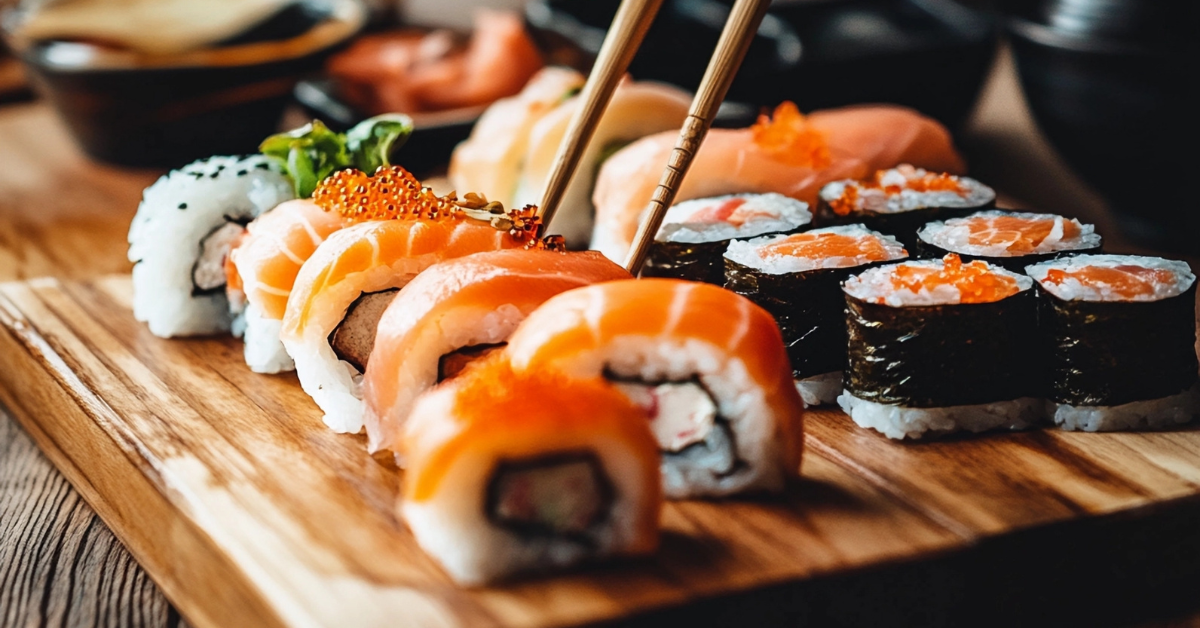Sushi is a traditional Japanese dish that has gained popularity all over the world thanks to its unique combination of flavors and artistic presentation, becoming one of the most iconic dishes in Eastern cuisine.
Its origins date back to ancient times, when in China fish was preserved through fermentation with rice. Over time, this technique evolved in Japan, where rice began to be consumed along with the fish.
.jpg?width=800&height=436&name=Sushi_giornata_internazionale_alimentazione_falsi_miti_UniSR%20(7).jpg)
In addition to its cultural value, sushi offers numerous nutritional benefits. It mainly consists of rice, raw fish, seaweed, vegetables, and avocado. This combination makes it a complete food. Sushi provides:
-
Omega-3 fatty acids: The so-called “good” fats found in foods like salmon or avocado have anti-inflammatory properties and can help reduce the risk of cardiovascular disease. They are also beneficial for brain health and well-being.
-
Proteins: Raw fish, such as salmon and tuna, is rich in high-quality proteins, essential for growth and muscle maintenance.
-
Carbohydrates: Rice provides energy through complex carbohydrates. There are also versions with brown or black rice that increase satiety and offer more dietary fiber.
-
Vitamins and Minerals: The seaweed used in sushi is a good source of iodine—necessary for proper thyroid function—as well as other vitamins (A, B1, B2, B5, C, and D) and minerals.
.jpg?width=800&height=533&name=Sushi_giornata_internazionale_alimentazione_falsi_miti_UniSR%20(2).jpg)
Seaweed
Among seaweeds, the most well-known is nori, used to wrap sushi. It is especially appreciated for its high iodine content, an essential mineral for thyroid health. Regular consumption can support proper thyroid function and, consequently, energy metabolism. It’s also a source of antioxidants, including carotenoids and phycobilins, which help fight oxidative stress and protect cells from premature aging. Additionally, thanks to its soluble fiber content, nori supports digestive health and may help lower LDL cholesterol levels, thus contributing to cardiovascular health.
.jpg?width=800&height=533&name=Sushi_giornata_internazionale_alimentazione_falsi_miti_UniSR%20(3).jpg)
Soy sauce
Soy sauce is a fermented condiment with interesting nutritional characteristics but also some aspects that require moderation. It is low in fat and cholesterol-free, making it a lighter option compared to other fattier sauces. It contains natural probiotics from the fermentation process, which can aid digestion and gut health. Thanks to the presence of antioxidants, including soy isoflavones, it may contribute to cellular protection and hormonal regulation. However, soy sauce has a very high sodium content, which can affect blood pressure and heart health if consumed excessively. Low-sodium versions are available and may be a better option for those needing to reduce salt intake without sacrificing flavor.
.jpg?width=800&height=533&name=Sushi_giornata_internazionale_alimentazione_falsi_miti_UniSR%20(1).jpg)
Wasabi
Wasabi, a perennial herb from the Brassicaceae family, also has beneficial properties due to bioactive compounds like isothiocyanates, which have antimicrobial and anti-inflammatory effects. However, its consumption should be limited in cases of gastritis, acid reflux, or irritable bowel syndrome.
.jpg?width=800&height=533&name=Sushi_giornata_internazionale_alimentazione_falsi_miti_UniSR%20(6).jpg)
Sushi is often perceived as a light and low-calorie food, but this assumption is not always accurate. While some versions are relatively low in calories, many preparations can have a high energy content and include ingredients that change the nutritional profile. The addition of sweet sauces, creamy cheeses, and mayonnaise—or cooking methods like frying—increase the calorie count and make sushi harder to digest. Furthermore, rice and fish are often not accompanied by vegetables, which means the meal may lack nutritional balance.
Sushi can be part of a balanced diet, but it’s important to choose simpler varieties and always pair them with a generous serving of vegetables.
.jpg?width=800&height=448&name=Sushi_giornata_internazionale_alimentazione_falsi_miti_UniSR%20(4).jpg)
References
- Appetite. 2025 Mar 1:207:107857. doi: 10.1016/j.appet.2025.107857. Epub 2025 Jan 10. Healthiness, appearance, or fashion? The drivers behind the sushi popularity in Italy. Carla Cavallo et al.
- O’Neil C, Nicklas T, Fulgoni V. Avocado consumption by adults is associated with better nutrient intake, diet quality, and some measures of adiposity: National Health and nutrition examination survey, 2001-2012. Intern Med Rev. (2017) 3:422. doi: 10.18103/imr.v3i4.422.
- Nutrients. 2025 May 8;17(10):1617. doi: 10.3390/nu17101617. Beneficial Effects of Traditional Fermented Soybean Sauce (Kanjang) on Memory Function, Body Water, and Glucose Metabolism: Roles of Gut Microbiota and Neuroinflammation. Yu Yue et al.
- Integr Cancer Ther. 2019 Jan-Dec:18:1534735419866908. doi: 10.1177/1534735419866908. Bioactive Immunomodulatory Compounds: A Novel Combinatorial Strategy for Integrated Medicine in Oncology? BAIC Exposure in Cancer Cells. Bruna Corradetti et al.
- Nutrients. 2020 Jan 26;12(2):327. doi: 10.3390/nu12020327. Food Combinations in Relation to the Quality of Overall Diet and Individual Meals in Japanese Adults: A Nationwide Study. Kentaro Murakami et al.
- Adv Nutr. 2024 Jul;15(7):100250. doi: 10.1016/j.advnut.2024.100250. Epub 2024 Jun 20. Dietary Patterns in Asia: Current Evidence and Future Directions. Lukas Schwingshackl.


.jpg?width=800&height=436&name=Sushi_giornata_internazionale_alimentazione_falsi_miti_UniSR%20(7).jpg)
.jpg?width=800&height=533&name=Sushi_giornata_internazionale_alimentazione_falsi_miti_UniSR%20(2).jpg)
.jpg?width=800&height=533&name=Sushi_giornata_internazionale_alimentazione_falsi_miti_UniSR%20(3).jpg)
.jpg?width=800&height=533&name=Sushi_giornata_internazionale_alimentazione_falsi_miti_UniSR%20(1).jpg)
.jpg?width=800&height=533&name=Sushi_giornata_internazionale_alimentazione_falsi_miti_UniSR%20(6).jpg)
.jpg?width=800&height=448&name=Sushi_giornata_internazionale_alimentazione_falsi_miti_UniSR%20(4).jpg)